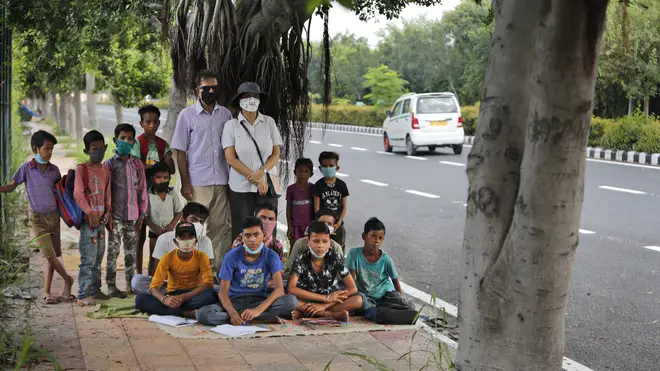
Ben Kentish 10pm - 1am
21 September 2020, 08:34

The children aged four to 14 carry book bags more than a mile from their thatched-roof huts to the impromptu roadside classroom in New Delhi.
An Indian couple are conducting free classes for underprivileged children on a pavement in New Delhi.
Most schools in India have remained shut since late March when the country imposed a nationwide lockdown to curb the spread of Covid-19, with many switching to digital learning and taking classes online.
But children from low-income families who attend public schools do not have access to the internet or the means to afford digital learning tools.
Veena Gupta, a singer, and her former diplomat husband Virendra Gupta, conduct the classes three times a week for dozens of children aged four to 14 in India’s capital.

The goal is to keep them learning and not left behind when schools reopen.
The children carry book bags more than a mile from their thatched-roof huts on the banks of the Yamuna River to the impromptu roadside classroom.
There they receive free lessons in maths, science, English and physical education.
The initiative began when Veena Gupta’s maid, who lives on the bank of the river, complained that with schools shut, children in her impoverished community were running amok and wasting time.

“If they stayed at home doing nothing, they’d become drifters,” said Dolly Sharma, who works at Veena’s high-rise apartment, which overlooks the lush riverbank.
Veena, a singer and grandmother of three, and her husband decided to go out to the street and teach the children so they are not left behind when school reopens.
“They don’t have access to internet, their schools are shut and they don’t have any means to learn,” said Veena, who bought books, pencils, notebooks and other teaching materials, and set up the small, open-air classroom under the shade of a leafy banyan tree.
India’s stringent lockdown to curb the spread of Covid-19 shut schools across the country in late March.

Most remain closed as the number of cases has surged past five million, making India the second worst-hit country in the world after the United States.
While many private schools switched to digital learning and online classes, children in most government-run schools either do not have that option or do not have the means to purchase digital learning tools such as laptops and smartphones.
“There is only one mobile phone in my family and it is usually with my father. I can’t study online,” said Nitin Mishra.
Mishra’s mother works as a part-time maid and his father is unable to find employment as India’s economy has been hit hard by the pandemic.

The street-side classes have grown as dozens of children showed keen interest.
Now the Guptas – with help from their driver, Heera – teach three different groups three times a week, morning and evening.
After class, the children are treated to homemade lemonade and biscuits prepared by Veena.
The Guptas said teaching the children makes them feel closer to their grandchildren, who live abroad.

“My father would make me spend my summer vacation learning the next year’s curriculum in advance,” said Virendra, who served as Indian ambassador to several countries including South Africa.
“That really boosted my confidence and made me interested in schoolwork. And that is what I am trying to do with these children, so when their school reopens, they are slightly ahead of their class.”
Veena said she hopes to recruit more volunteers to teach the street-side classes.

“It is not about the money that people can contribute and give, it is about their time,” she said.
“They should take out a little bit of their time, an hour or so, if not every day, every alternate day, and come and help these children.”